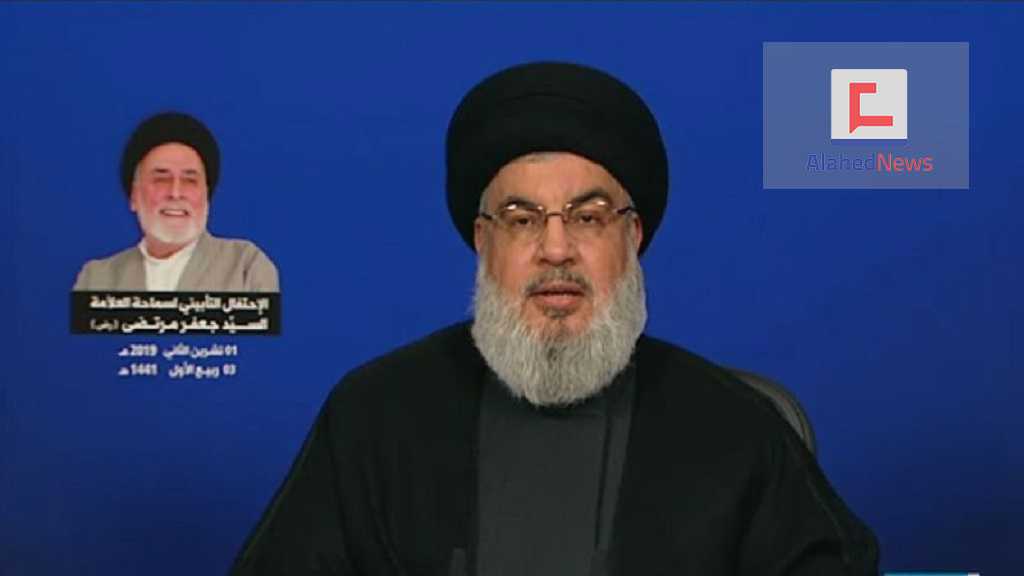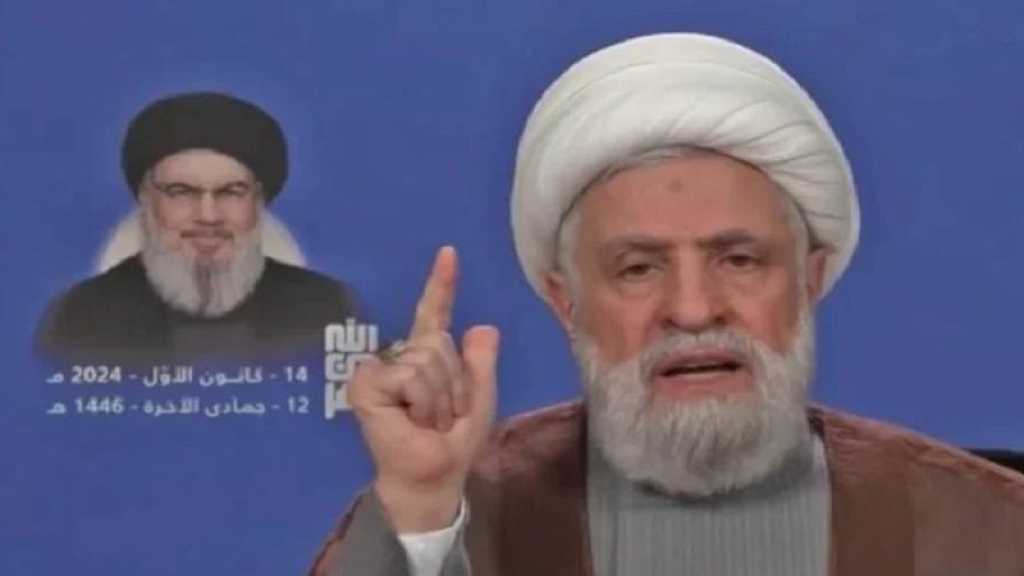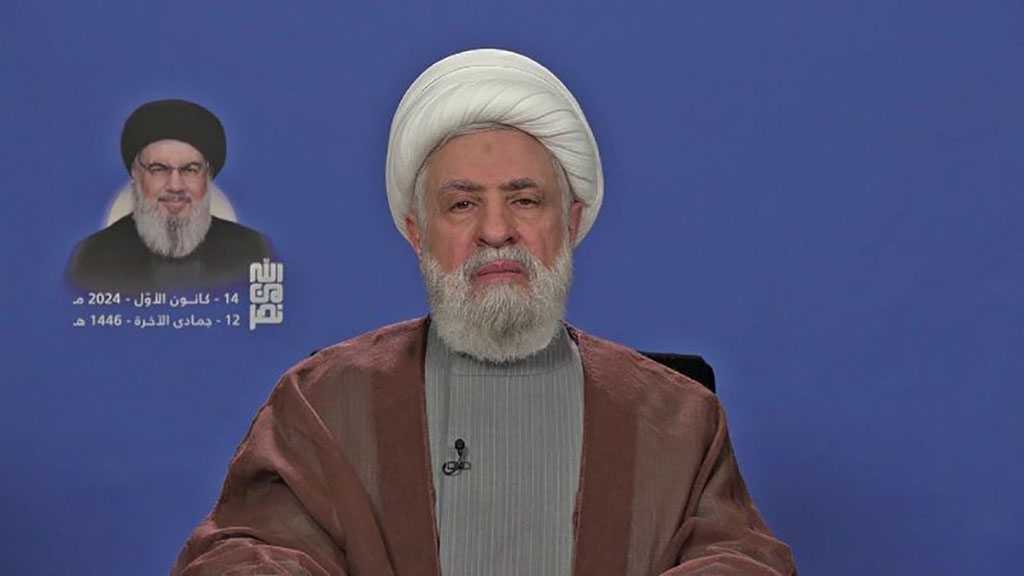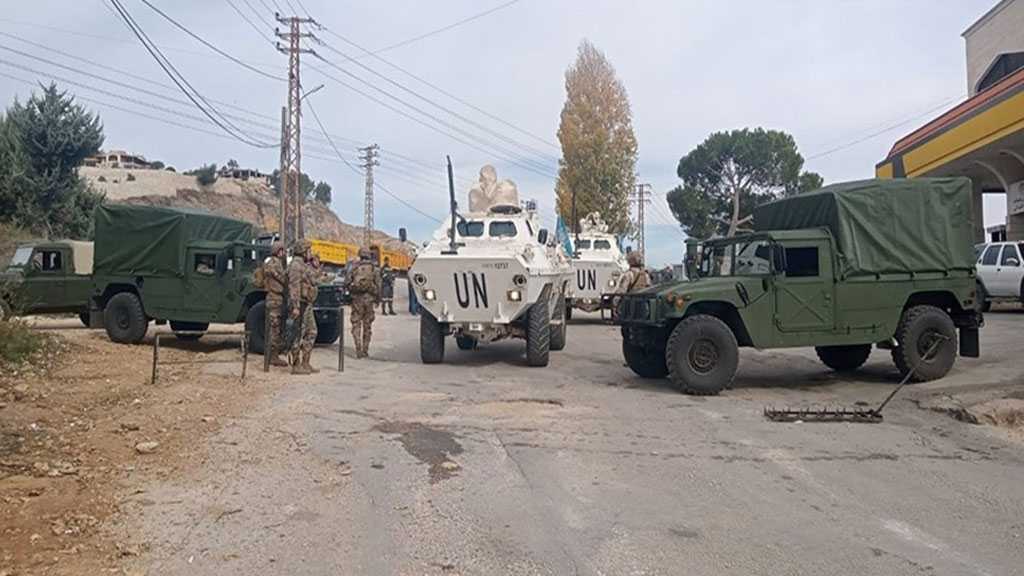
Full Speech of Hezbollah SG Sayyed Nasrallah at Memorial Ceremony of Ayatollah Sayyid Jaafar Murtada Al-Ameli

Translated by Staff, Hezbollah Media Relations
To the spirit of our great and precious departed, His Eminence Ayatollah Sayyid Jaafar Murtada, may Allah be pleased with him, we give the reward of al-Fatiha.
I seek refuge in Allah from the accursed Satan. In the name of Allah the Most Gracious the Merciful. Praise be to Allah, Lord of the Worlds, and prayers and peace be upon our Master and Prophet, the Seal of Prophets, Abi al-Qassem Muhammad Bin Abdullah and his good and pure household and his good and chosen companions and all the prophets and messengers.
Scholarly gentlemen, brothers and sisters, Peace and Allah's mercy and blessing be upon you all.
Allah says in his Glorious Book:
{In the name of Allah the Most Gracious the Merciful. The ones whom the angels take in death, [being] good and pure; [the angels] will say, "Peace be upon you. Enter Paradise for what you used to do."}
He also says:
{Allah will raise those who have believed among you and those who were given knowledge, by degrees. And Allah is Acquainted with what you do.}
Imam al-Sadiq (Peace Be Upon Him) says:
“Whoever acquires knowledge and practices what he has learned and teaches it to others for the sake of Allah, among the angels of heavens he will be called a great personality. It will be said there: ‘He learned for the sake of Allah, practiced for the sake of Allah and taught it for the sake of Allah.’"
I welcome you all to this memorial ceremony, this sad and painful occasion, which we greet with sorrow and grief. At the same time we submit to God's will and exercise content with His judgment and destiny.
First of all, I would like to address the family of our deceased, dear and great Sayyid, each and every single one of the family members. I extend my sincerest condolences and sympathy on this occasion and over this big loss for the Islamic world, the Islamic school of thought, education and also a loss for an important source of jihad, the ideological jihad that is an essential part of the greater jihad.
We ask Allah Almighty to grant this family and all the people who love them peace, tranquility, admission and satisfaction. This is what is expected for them of course.
I would like to divide this speech into two parts and talk about two issues. The first will be about the occasion at hand and about the person himself. And the second section about the developments in our country.
The Sayyid, may peace be upon his soul, spent his life seeking knowledge when he was a student at the Islamic Hawza. He sought knowledge, to teach, investigate, author books and respond to different religious and cultural questions. He also spent his blessed life educating students of religious sciences and generations of scholars while establishing and founding many religious seminaries for this purpose, both in Lebanon and in the holy city of Qom.
The main trait that defined his life and personality was knowledge and focusing on educating and teaching. Others focused on politics or jihad. His Eminence the late Sayyid defined his religious mandate as one that focused all his time on this important space and filling a large gap on this front. It is true that he did not take up politics or follow up political details on a daily basis, but his presence was felt in when it came to major events. He supported the Islamic Revolution in Iran lead by Imam Khomeini (may peace be upon his soul). This revolution changed the face of the region and the world in 1979. He was also one of the supporters who strongly backed the establishment of an Islamic Republic in Iran following the victory [of the revolution]. He also had close ties with high-ranking leaders in the revolution as well as great religious references [Maraji’] and distinguished scholars in the Hawaza. His scholarly contributions were helpful in the various affairs relevant to a young state. Among these contributions was the codification of the first constitution of the Islamic Republic of Iran. Also, during the eight-year-war imposed by the world’s arrogant forces on the Islamic Republic of Iran, His Eminence used to go to the front lines to carry out his role and to encourage people to practice jihad and show steadfastness. He held many meetings while conducting educational and orientation courses, which included commanders in the armed forces. For these he relied on Islamic guidance and texts available to us such as God Almighty’s book, Allah’s Prophet and the experience of Sadr al-Islam in the issues of war, fighting and jihad. He has always supported confronting the Zionist entity and the Zionist project. He also supported the resistance movements in the region and in Lebanon, especially the Islamic Resistance.
Until the final moment of his life, he expressed his support for the resistance in his books, which will be handed down from one generation to another. He spoke about the Islamic Resistance in Lebanon as well as its experiences, its victories, its Mujahideen and its people in his books, lectures and lessons. He articulated this support by playing the role of a father to many of its Mujahideen.
He was very happy with the victory of the resistance in the 2006 war as was mentioned in the earlier report. He was proud of the victory which was achieved by the resistance and the people of the resistance. He always used to say: whatever the sacrifices, the important thing is that we achieved victory. For a person like him who fights along the intellectual front, his most important possession was his library, which contained tens of thousands of books, a large number of manuscripts and his handwritten scripts that were not printed. His work was lost due to the bombing that destroyed many homes including his house and his center. He has always supported the option of resistance in confronting the terrorist Takfiri attack. You know back then, some people questioned this option, the option of resisting the aggression, which wanted to eliminate the present and the past and throw our region and our people into a dark and unknown future. He also loved Imam Khomeini (may peace be upon his soul). He composed one of his longest poems, Sanabel al-Majd, to lament Imam Khomeini. When the Assembly of Experts in Iran elected His Eminence Imam Khamenei (may God preserve him) as a leader and the wali [Islamic legal guardian] of Muslims after Imam Khomeini departed from this world, the late Sayyid was one of the strongest supporters of this appointment whether he was in Iran or after he returned to Lebanon. He has always been eager to ensure that this leadership position is preserved, safeguarded and obeyed. He placed great hopes on it.
I return to this unique trait that characterized his personality, the educational, ideological trait. The Sayyid wrote, researched and investigated various sciences and fields of knowledge, including Fiqh [Islamic jurisprudence], Tafsir [exegesis], Kalam [Islamic scholastic theology], Aqidah [creeds], Sirah [prophetic biography], history, the subjects of governance, administration, war, jihad, ethics and education, sociology and psychology and the issues of the Islamic economy and the markets. It is not too much of a stretch to say that His Eminence wrote about all areas relevant to Islam. A quick overview at his many works confirms what I said. He never stopped his jihad, which was writing and investigating, except when he was no longer able to hold a pen because of his illness. During the years in which he suffered from his chronic disease and despite the difficult and tiring physical and psychological conditions – we know what it means when someone suffers from such an illness and how it affects one's body and psychology – he did not stop investigating and writing, even under the most difficult health conditions. During this hard time, he completed several encyclopedias, especially on the life and sirah of the masters of youth in heaven, al-Hassan and al-Husain (peace be upon them), in more than 30 volumes.
Even though his studies focused on different fields and he had many interests, His Eminence the Sayyid took up the most difficult field. In my opinion, the most difficult, the most dangerous and the most sensitive field is writing about and investigating Islamic history as well as publishing encyclopedias.
Why do we say that Islamic history is the hardest, most dangerous and most sensitive field? When you want to know the facts about history and the events that have taken place throughout history, some people might ask what is history for? History is facts, events and developments that have taken place whether they were major or minor issues.
What is written about these facts is called history. These facts in themselves could be called history. When you want to get to know these facts especially in Islamic history, there are big difficulties in conducting such an investigation. My speech, however, is not an educational or scientific research. It is only to give you an idea. Let us take an example about a particularly long period of time. We are looking for events and facts that took place 1400, 1300, 1200 or 1100 years ago, especially since Sayyid focused on the early centuries of Islamic history.
It is difficult to gain accurate and precise knowledge about this period. We are not prevented but it is a very difficult matter. We have events that took place decades ago. So, today in our modern life when someone wants to write about these events or document them or investigate them, we will find diverging texts, opinions, theories, articles and narratives. The difference depends on the investigator’s cultural, ideological and political background, affiliations and positions.
It is also not just about what happened years ago or decades ago but what is happening now. For example, we have this movement, which sprung up in Lebanon in the past two weeks. Now, everyone is writing about it differently – not after a year, two years or one hundred years. Everyone also interprets it differently. Everyone has different information and evaluation regarding the movement. Later, if someone wrote about its history, we will read different, contradictory and opposing versions about events that we have all the tools and means to document.
Thus, the time interval poses a great difficulty.



